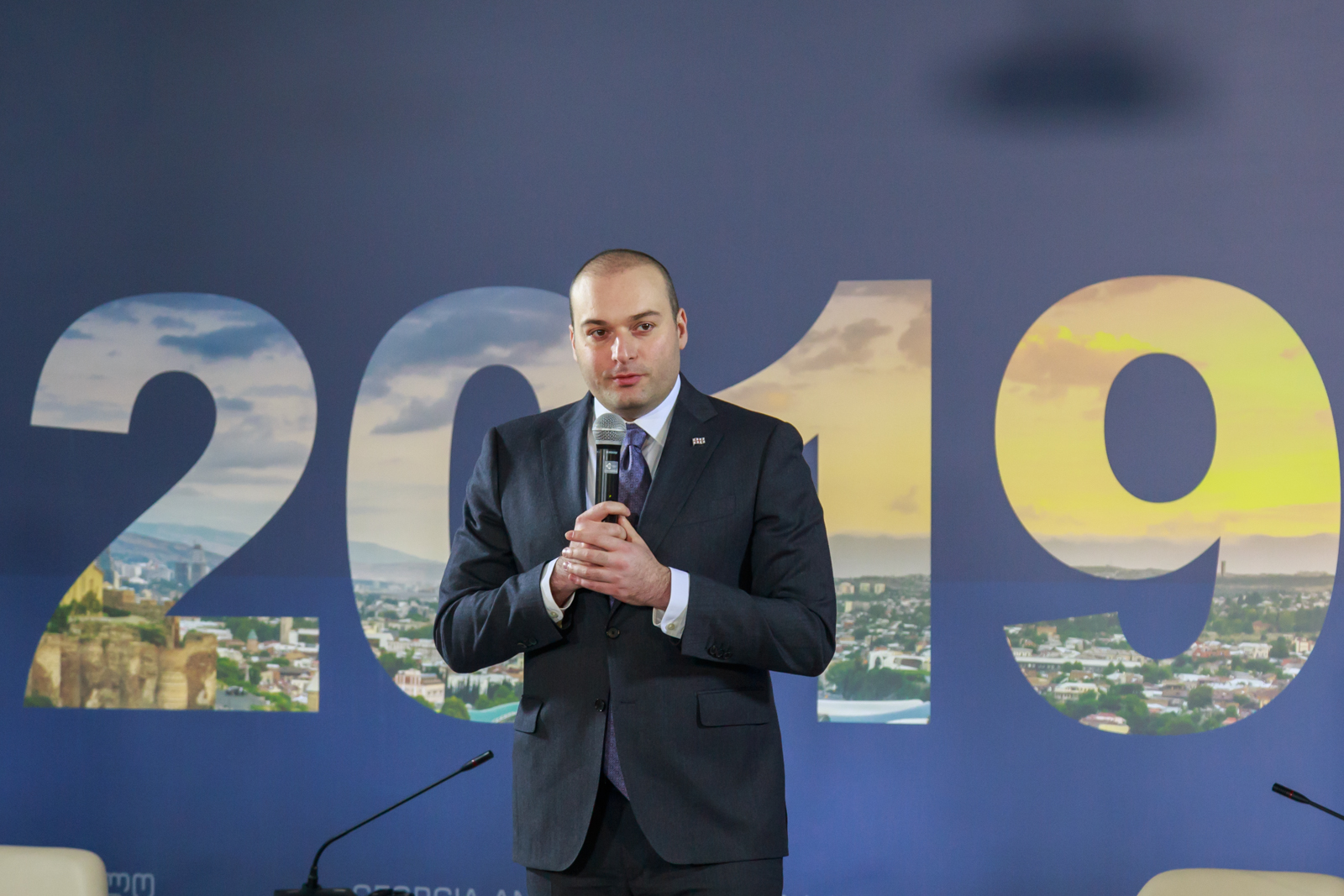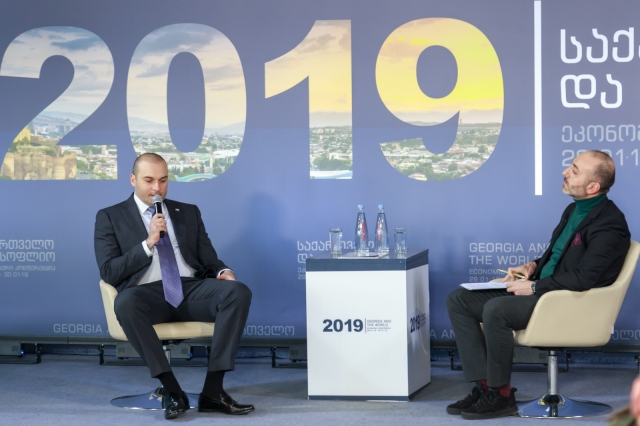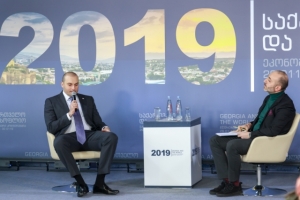The Prime Minister on the Davos Forum & Georgia’s Economic Prospects
Export to EU countries increased by 11% in 2018, mostly thanks to the Free Trade Agreement (FTA) Georgia has with the EU. Georgia is also a unique country in that it has FTAs with both the EU and China.On the World Bank Doing Business Rankings, Georgia is in 6th place, and in 2018 it saw eight million tourists grace its shores. Overall, the situation seems to be looking up. But much still needs to be done to keep it up and boost it further.
Prime Minister Mamuka Bakhtadze recently returned from Davos, Switzerland, where he attended the World Economic Forum (WEF) and saw himself and his country evaluated very positively by the high-level figures there, including the President of the European Bank for Reconstruction and Development. George Sharashidze, Editor-in-Chief of ‘The Economist World in 2019 – Georgia’ sat down with the Georgian PM to find out more.
What were the expectations of Georgia at the WEF?
The World Economic Forum 2019 was especially successful for Georgia. Our major strategy is to make Georgia an economic center of the region in trade, finance, logistics, tourism and education. At the Forum in Davos, we received a positive reciprocal connection from all the major players participating in the event, including the representatives of both the business and political sectors.
Georgia was also assessed positively [there] for its reforms. Georgia is considered the most successful country in this region in terms of democratic and economic transformation.
The reforms that are set for future implementation in our country also received good reviews. The possibility of online registration for companies is one of the most important future reforms. Another new legislative initiative under consideration comprises offering special tax rates to transnational companies which launch headquarters in Georgia and serve their customers from our country. Large technological companies which set up part of their research and development infrastructure in Georgia will also benefit from the same offer.
These offers have already garnered interest, with negotiations begun with a number of major companies in Davos. Such initiatives will certainly contribute to the attraction of important and valuable investments.
And we are well aware that even though the World Economic Forum 2019 was effective, we will be expected to present the fruitful outcomes of the abovementioned initiatives when we visit Davos in 2020.
You have an ambitious plan to include Georgia among the Top 5 countries in all the major rankings. How will you do it?
Coming 6th place in such a prestigious ranking system as Doing Business already proves that Georgia has the potential and capability to obtain leading positions in other major rankings as well. Moreover, if the country has the ambition to become a regional economic center, it is a primary necessity for Georgia to be included in the Top 5 countries. We are involved in the global competition and, thus, we need to maintain our position and even advance it. Being included in significant ranking systems is not an aim without purpose: it is an opportunity for the country to overcome the challenges facing it in the economic sphere, the most painful among them being poverty. I believe more effective integration of Georgia into the global economy will help us to better deal with these obstacles.
Sadly, in the Human Capital Index, Georgia is not very successful. In the 21st century, an era of technological development, human capital is of a paramount importance. I do believe that Georgia has incredible prospects in human capital, and one of our main aims is to invest in education and develop our country’s human resources, which will finally contribute to the inclusion of Georgia on the list of developed countries.

What are your plans to accelerate Georgia’s integration into the global economy? Do you expect an FTA with the USA at any point?
Our aim is for Georgia to be effectively integrated into the global economy. Without completing this task, Georgia will fail to become the regional economic hub. Having a free trade regime with the EU and China is certainly a historical achievement for Georgia. Yet, it is important not to take the given success for granted and to use it efficiently. Although we have those FTAs, it is clearly impossible to double the rate of exports immediately. However, the existent augmentation of this figure clearly underlines the FTAs’ importance for the economic development of the country. As we are involved in the global competition, we need to meet particularly high standards.
One of the major aspirations is for Georgia to become a full member of the EU, and our successes in the economic field help us to make steps towards this goal.
Nevertheless, there are a number of issues faced by the country in satisfying the standards. There is lack of well-equipped laboratories and infrastructure for the fast and appropriate development of the agricultural field. And the government is putting a lot of effort into this and has allocated a budget to eradicate these troubles.
It is also vital to take into account that attracting major players to the Georgian market is incredibly important for us to be involved more effectively in the global economic chain. The idea of offering special tax rates to transnational companies has been catalyzed by this aspect.
And we are actively in the process of negotiating an FTA with the USA. I’m very optimistic about reaching a consensus on this topic.
Tourism is one of the fastest growing industries in Georgia. How will the gov’t boost this and what weaknesses have been identified in the sector?
Tourism is and will remain the most dynamically developing industry in our economic sector. We are certainly interested in diversifying our tourism options; however, we also need to overcome particular barriers. The number of direct flights to European cities is not yet satisfactory, and sea transportation also needs to be developed.
We must ameliorate the quality of tourism and adopt new segments in this industry, as well as improve the infrastructure of the country.
Georgia has real potential for establishing recreational, health and cultural tourism. The government aims to especially support these fields.
Transcribed and translated by Keti Kvaratskheliya












